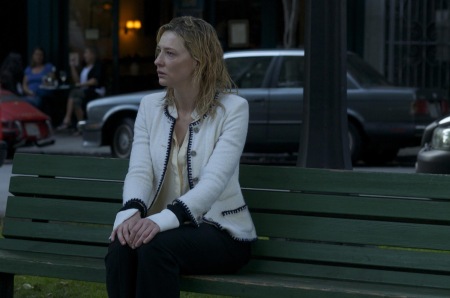 |
| Looks like someone’s in the mood for Karaoke! |
Woody Allen has always come across as a grounded yet neurotic comedian who haunts NYC, even though he has now been rich for the better part of a century. In Blue Jasmine, he turns his gaze to the motivations of high society individuals, and as in his earlier film Match Point, he doesn’t really like what he sees. Blue Jasmine concerns the titular blue blooded matron, who is forced to move back to San Fran with her sister Ginger after the dissolution of her wealth and marriage. In a tiny apartment filled with kids and her sister’s grease monkey beau she has to see if she can adjust down to her new standings, while her sister is instigated to come to terms with her own aspirations.
 |
| Someone’s disappointed in you… |
Ultimately this is a character study of Jasmine, a person who is unable or unwilling to accept her new circumstances. Much like the film Young Adult, we are met with a flawed protagonist who is deeply unlikable and are shown their last shot at redemption. Jasmine is nasty to her scrappy sister, dismissive of her colorful friends, and horrified by the prospect of working for a living. Her previous life, related in numerous flashbacks, was mostly hosting and toasting leaving her ill-prepared for naught but trophy wifing. She dredges up old mistakes and fires taunt after withering taunt even though the audience plainly understands that only circumstance separates the sisters. To Allen’s credit he mostly toes the line between extremes of victimhood and maliciousness. Jasmine is not sympathetic, but she also wasn’t exploitative, just self-centered. Can a person like this evolve?
 |
| Jack Donaghy stars as…Alex Baldwin. Or maybe this is the sequel to Glen Gary |
At first the film suggests so, tentatively. Jasmine begins to work and go to school. Her largest setbacks actually come from the life she can’t let go of in her head. However it remains hard to empathize with Jasmine and her neurotic verbiage whether she is succeeding or failing. That gap between the audience and the protagonist emotionally distances the events in the film. It’s an interesting quandary, wondering if an unpleasant person is deserving of sympathy, but the finer points of that argument are lost in the broad strokes Allen uses to create this story. Woody has opted for the general stereotypes and easy coincidence of a parable, but parables work better on powerfully thematic material. Young Adult found purchase in the gritty details of Theron’s self-centered heroine, showing the amount of effort both mentally and physically it took to be insufferable. Blue Jasmine is a film almost without any detail, even eschewing explanation for the tale of two sisters setup. I’m not arguing that lack of details are plot holes or that a generalized film can’t work, but when Blue Jasmine is done there won’t be much for you to grab onto. For a rich man, Woody doesn’t seem to have any insights into how the rich live (we see only galas and poolside investment talk). Likewise San Fran Sister’s friends are grease monkeys exclusively. Only the character’s played by Louis CK and Andrew Dice Clay acquit themselves, inhabiting slightly fuzzier lower middle class expectations.
 |
| Ugh poor people, and from the 1960’s. |
Cate Blanchett really fills out what she’s given with Jasmine, creating small ticks that reflect the character’s fragile state of mind, but Jasmine is never someone you’ll care about and you’re never given a reason to. Her sister Ginger’s sub-arc ties in but suffers from the same vague definition. The events in Blue Jasmine are general enough that everything is realistic, but it never feels real. The message discussed is a good one; that people hurt each other for status gain and rationalize it. But the casual way in which Blue Jasmine addresses this muddles its impact. Woody Allen has created some of the most deeply personal and individualistic characters in cinema, so it’s strange to see a film filled with broad archetypes and events, where no one can comment on what’s happening around them. Blue Jasmine is an ably crafted look at how status, sympathy, and bile mix but it is a pale reflection of the real world.
2/4
**Originally Published on Synthetic Error December 4, 2013
Comments
Post a Comment